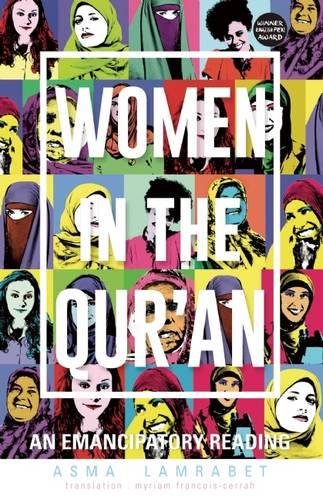Q and A Women in the Qur’an: An Emancipatory Reading
A Journal of Gender & Culture
Vol. XVII No. 1 January 2017
Published with support from the University Grants Commission
Q and A
NEW BOOKS FORUM
Women in the Qur’an: An Emancipatory Reading
by Asma Lamrabet Leister, Uk: Square View, 1916
What was your main purpose in writing Women in the Qur’an?
The main purpose was to demonstrate that the real problem with Islam as a religion is not inherent in the scriptural sources but in the millenary interpretations which are human contributions that re ect the socio-cultural backgrounds of different Muslim theologians. The primary spiritual message was more ethical, general, and liberatory than the successive compilations of the works of the ulema which have been embedded in their own political and social contexts.
What prompted the timing of your decision to write the book?
I was a little worried by both the growing Islamophobia in the West and the rise of political Islam in the Muslim societies. These two visions are wrong because they are essentialist and reduce the spiritual message of Islam to a binary and dualist approach of haram/halal (licit and illicit) and to a jurisprudential vision that is very far from the ethical essence of the Qur’anic spirit.
Who did you see as your audience?
I was surprised to see that I have an audience composed perhaps of more Muslim men than Muslim women and also to see many supporters from other faiths, mostly young women who are very liberal but have no religious background.
198 Q and A
In taking up issues of equality, justice, freedom, liberation, and gender within Islam why did you decide to focus on the Qur’an, and more particularly on how the Holy Scripture speaks of and to women?
Because we have to start with the rst and principal source of Islam; the Qur’an which according to all Islamic traditions, has priority for our understanding of Islam. Also, because the problem we are facing today is that traditionalism and orthodox interpretations have marginalized the spirit and essence of the Qur’an in favor of interpretations of Muslim scholars who perpetuate thinking found in medieval Islamic literature which was very patriarchal and discriminatory against women. While the Qur’an was very emancipatory there has been a problem with the prophetic tradition (the Sunna) which was codi ed a century after the death of the Prophet. Many scholars have based their interpretations on unauthentic hadiths (the sayings and deeds of the Prophet which constitute the Sunna) or read them out of context. It is important to take into account the hadith but we have to keep in mind the jurisprudential principle that: “The Sunna cannot contradict the Qur’an.” So we have to be very careful in our analysis and reading of the hadith.
Why do Muslim women as interpreters of the Qu’ran and other religious texts make a point of asserting that they are believers or believing women when men who interpret religious texts do not announce that they are believing men?
I don’t think that Muslim men do not announce that they are believing men. But from my own perspective this is important, because it explains from where I am speaking. While non-believers have the right to say that they are non-believers or atheists, I also have the same right to speak from my own position. Finally, whatever the difference in our starting points, the most important thing is our objectives such as justice, liberation, and equality.
How do you locate your work: in what intellectual and scholarly lineages or communities? Do you see your work as being part of Islamic feminist discourse?
At this stage of my itinerary, I see my work mostly as being part of an Islamic global, decolonial, reformist, and feminist discourse which is emerging from a movement in solidarity with all women from the South and the South which can also be present in the heart of the North. Wherever there is a woman or man oppressed I feel concerned as a Muslim and human being. This is for me what it means to be committed to my faith. It is to be committed to justice.
Samyukta: A Journal of Gender & Culture (January 2017) Vol. XVII. No. 1
Powered by TCPDF (www.tcpdf.org)
New Books Forum 199 Do you identify yourself as an Islamic feminist?
Yes, but as I have just said, within the framework of global justice and liberation from all kinds of oppression.
Why did you write the book in French rather than Arabic?
I had a primary school education entirely in French so my French is stronger than my Arabic even though I read and I write Arabic very well. I feel more comfortable with French and I think that French is still very important in our context as a country which was colonized by France. This also explains many problematics that we are still dealing with today such as the dilemma concerning modernity and tradition. An Arabic translation of this book was published in 2012.
What do you see as the major contribution of your latest book?
Offering a new understanding and approach to the problematic of women and Islam.
Do you think your book will help women, and perhaps men, change their behaviors? Will it serve as an activist text?
I hope so. Some people now are proposing it as an of cial text for use in the university. Many students from Morocco and other countries are using it in their research, including for their PhDs. Many Moroccan women activists from different associations are already using it to support their political activism to change laws.
Q and A
Islam Et Féminism: Genèse D’un Courant Controversé Prèface, Alain Gresh by Malika Hamidi Paris: Éditions les Aubes, 2017
Tell us about the subject of your book.
The condition of Muslim women around the world has progressed signi cantly over the past decades regarding access to education and involvement in political life and civil society in the West and in the global Muslim world. In my book I wish to introduce the main woman actors who promote the discourse of Muslim feminism, reclaiming Muslim women’s
Samyukta: A Journal of Gender & Culture (January 2017) Vol. XVII. No. 1
À propos de l'auteur

ASMA LAMRABET
Native de Rabat (Maroc), Asma Lamrabet, exerce actuellement en tant que médecin biologiste à l’Hôpital Avicennes de Rabat. Elle a exercé durant plusieurs années (de 1995 à 2003) comme médecin bénévole dans des hôpitaux publics d'Espagne et d’Amérique latine, notamment à Santiago du Chili et à Mexico.






